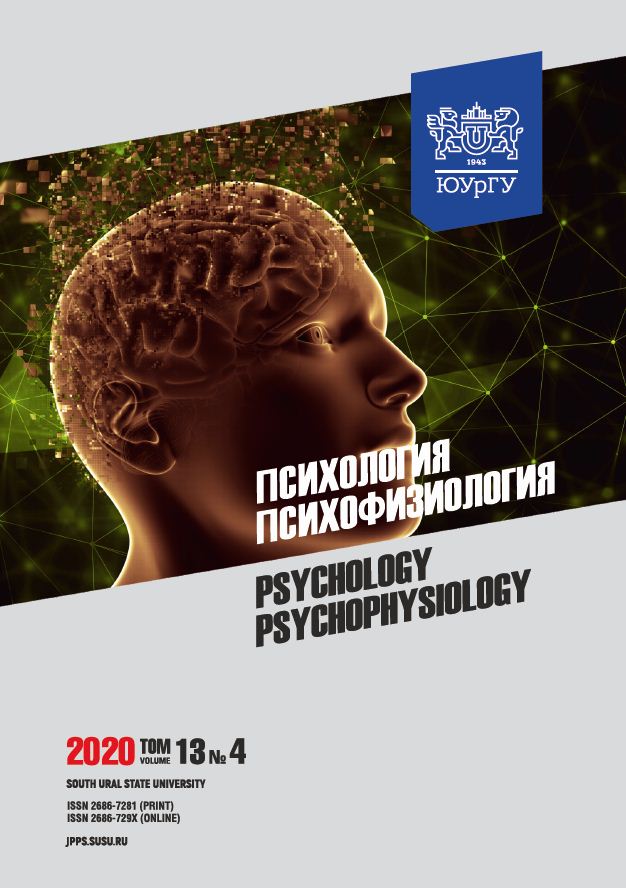COMMUNICATIVE TOLERANCE AND SOCIO-PSYCHOLOGICAL ADAPTABILITY OF FOREIGN STUDENTS FROM CENTRAL ASIA STUDYING AT ST. PETERSBURG UNIVERSITY: GENDER ASPECT
Abstract
Background. The article presents the results of the study of socio-psychological adaptation in Russian and foreign first-year students. It is known that the constructive interaction of foreign students with the educational and professional environment, as well as their comfortable living on the territory of the Russian Federation is impossible without tolerant behavior. Aim. The paper aims to establish the features of communicative tolerance and socio-psychological adaptability of Russian and foreign students (both male and female). Materials and methods. 42 first-year students of the CIS countries and 40 Russian first-year students (the control group) were examined. The average age of students was 19.95 years. The study was based on the following methods: V.V. Boyko general communicative tolerance questionnaire, the Rogers and Dymond technique of measuring socio-psychological adaptation (modified by A. Osnitsky), the Eysenck personality questionnaire (edited by A. Rukavishnikov and L. Sosnina). Data processing was performed with the help of the Student's t-test and Pearson correlation analysis using the SPSS 22.0 statistical program package. Results. Multiple differences were found between the indicators of general communicative tolerance and socio-psychological adaptability in foreign and Russian students. Female students showed only one difference according to the scale of socio-psychological adaptation. Their social desirability is more pronounced, which can be interpreted as a higher level of communicative tolerance. There are direct and inverse correlations between communicative tolerance and socio-psychological adaptability in foreign and Russian students. Russian students have higher values of socio-psychological adaptability than foreign students. Conclusion. The features of communicative tolerance and socio-psychological adaptability of Russian and foreign students during their adaptation to the new educational and cultural environment of St. Petersburg were established.
Downloads
References
2. Arzamastseva N.G., Konstantinova V.V. [Features of students ethnic tolerance formation in a multicultural educational environment of the university]. Vestnik Marijskogo gosudarstvennogo universiteta [Bulletin of Mari State University], 2019, vol. 13, no. 3, pp. 313–318. (in Russ.). DOI: 10.30914/2072-6783-2019-13-3-313-318.
3. Asmolov A.G. [On the meanings of the concept of tolerance]. Vek tolerantnosti [Age of Tolerance], 2001, no. 1, pp. 8–18. (in Russ.).
4. Beletskaya E.A., Demirkhan S. [Specifics of the formation of tolerance in the student en-vironment to representatives of different nationalities in the educational space of the university]. Sborniki konferentsij NITS Sotsiosfera [Collections of conferences of SIC Sociosphere], 2014, iss. 28. pp. 146–149. (in Russ).
5. Bondyreva S.K., Kolesov D.V. Tolerantnost (vvedenie v problemu) [Tolerance (introduc-tion to the problem)]. Moscow, Publ. MPSI; Voronezh: Publ. MODEK, 2003. 240 p. (in Russ.).
6. Danilenko L.P. [Features of socio-psychological adaptation of students when entering the university environment]. Vestnik Moskovskogo gosudarstvennogo oblastnogo universiteta. Serija Psikhologicheskie nauki [Bulletin of Moscow State Region University. Psychology Series], 2020, no. 1, pp. 101–109. (in Russ.). DOI: 10.18384/2310-7235-2020-1-101-109
7. Koryakina A.A. [On the issue of the formation of tolerance in the multicultural educational space]. Azimut nauchnykh issledovanij: pedagogika i psikhologiya [Azimuth of scientific research: pedagogy and psychology], 2019, vol. 8, no. 1 (26), pp. 179–182. (in Russ.).
8. Lanina L.V. [Adaptation of foreign students in Russian universities (on the example of Astrakhan state medical university)]. Mir nauki. Pedagogika i psikhologiya [The world of science. Pedagogy and psychology], 2019, no. 5. URL: https://mir-nauki.com/PDF/07PDMN519.pdf (accessed 16.05.2020). (in Russ.).
9. Odinokaya M.A., Sheredekina O.A. [Problems of adaptation of foreign students in the conditions of a Russian university]. Voprosy metodiki i prepodavaniya v vuze [Questions of teaching methods at the university], 2019, vol. 8, no. 30, pp. 20–27. (in Russ.). DOI: 10.18720/HUM/ISSN2227-8591.30.02.
10. Soldatova G.U., Nestik T.A., Shaygerova L.A. [The principles of building tolerance and managing xenophobia risks]. Natsionalnyj psikhologicheskij zhurnal [National Psychological Journal], 2011, no. 2(6), pp. 60–79. (in Russ.).
11. Khamidi E. [The problem of developing tolerance in the process of teaching foreign students]. Professionalnyj proekt: idei, tekhnologii, rezultaty [Professional project: ideas, technologies, results], 2014, no. 4, pp. 75–79. (in Russ.).
12. Ping L., Jing X., Othman B. et al. An Intercultural Management Perspective of Foreign Students Adaptation in Chinese Universities: A Case Study of China Three Gorges University. Engineering technology & applied science research, 2019, vol. 9 (2), pp. 3971–3977.
13. Angelova I. Adaptation of foreign medical students in a new sociocultural environment. Pedagogika-Pedagogy, 2020, vol. 92 (6), pp. 847–857.
14. Bulhakova O. Students psychological readiness for social interaction: system and subjective approach. Science and education, 2018, vol. 1, pp. 117–123. DOI: 10.24195/2414-4665-2018-1-16.
15. Stoykov A. Dynamics of the communicative tolerance and the attitude of accepting the other person in the social work students. Amazonia Investiga, 2019, vol. 8 (21), pp. 538–550.
16. Xing Zh. Model of pedagogical support for foreign students in the process of adaptation to training at universities of Ukraine. Science and education, 2017, vol. 6, pp. 38–43.
17. Yu B., Zhang K. “Its more foreign than a foreign country”: adaptation and experience of Mainland Chinese students in Hong Kong. Tertiary education and management, 2016, vol. 22 (4), pp. 300–315.
References on translit
-


